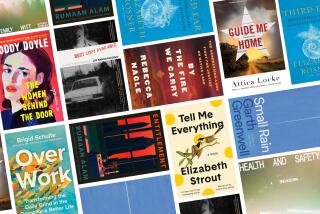Book review: ‘Damned’ by Chuck Palahniuk
- Share via
When it comes to drawing up a vision of hell, there are few American writers better suited to the job than Chuck Palahniuk. No stranger to examining all manner of unsavory if potentially damning behavior in a steady stream of bitingly funny, provocative novels including “Fight Club,” “Choke” and “Survivor,” Palahniuk now turns his caustic eye toward the devil’s proper domain with his 12th novel, “Damned.”
Enlisted by Palahniuk as our guide into the underworld is Madison Spencer, an overweight, recently deceased 13-year-old girl sentenced to an eternity in hell after an apparent marijuana overdose (though, of course, there’s more to her death than that). Introducing every chapter with a Judy Blume-tweaking “Are you there, Satan? It’s me, Madison,” she is a precocious, dryly cynical type who wouldn’t seem out of place in an early Tim Burton movie — or among Palahniuk’s dedicated audience, come to think of it.
If you’re already a fan of Palahniuk’s gleefully misanthropic voice, there’s a lot that will seem familiar in “Damned” — a knowingly sarcastic first-person narrator, a pointed use of repetition that develops into something like a lyrical hook (such as Madison’s reflexive defensiveness about her advanced vocabulary) and a ravenous appetite for society’s sacred cows, from all sides of the political spectrum.
In addition to delighting in revealing that the fundamentalist Christian view of evolution was correct all along — a bearded Charles Darwin makes a particularly petulant cameo — Palahniuk has all sorts of fun with Madison’s memories of her parents, a hypocritical Hollywood power couple maybe only a few broad strokes removed from Brangelina. As they superficially support a variety of liberal causes while adopting a rotating cast of international orphans, their materialistic behavior frequently veers into over-the-top cartoonishness, but subtlety has never had much value in Palahniuk’s world.
To that end, the book is at its best when Palahniuk lets his imagination run wild in constructing his personal hell. Internet pornography and all those telemarketing calls during dinner? Both come from hell, naturally, a clever detail revealed when Madison takes an afterlife desk job trying to ruin the moods of the living with more-pointless-than-usual marketing surveys. High-culture films such as “The English Patient” are aired punitively, and the only currency is Halloween candy, which litters a landscape marked by foul landmarks such as the Steaming Dogpile Mountains and meadows of toenail fungus. In an entertaining sort of theology lesson, Palahniuk terrorizes the damned with a variety of demons from long-dead religions, one of whom eventually admits to being represented by William Morris.
However funny these details are, Palahniuk has trouble building a genuine story around them. Though Madison often reflects on an unrequited — and ultimately fatal — first love and feels flashes of sentiment about death and dying young, her journey finds purpose only when she realizes how far she can rise among hell’s historical strongmen by no longer trying to please anyone. It’s a transformation that feels empty for a character who didn’t seem all that considerate to begin with. An amusing parallel between Madison’s traveling companions and the cast of John Hughes’ “The Breakfast Club” shows promise but ultimately goes nowhere, and an inevitable twist involving Madison’s eventual encounter with Satan himself feels forced, and ultimately more confusing than revelatory.
Considering that the book abruptly ends with a promise of more to come, maybe Palahniuk has plans to fill in the blanks down the road. Or maybe failing to provide tidy answers at the end is his idea of a last bit of commentary on the afterlife. Either way, as amusing as Palahniuk’s vision of hell can be on the surface, eventually you can’t help wondering why you’re there and, more important, why on Earth you’d go back.
More to Read
Sign up for our Book Club newsletter
Get the latest news, events and more from the Los Angeles Times Book Club, and help us get L.A. reading and talking.
You may occasionally receive promotional content from the Los Angeles Times.











